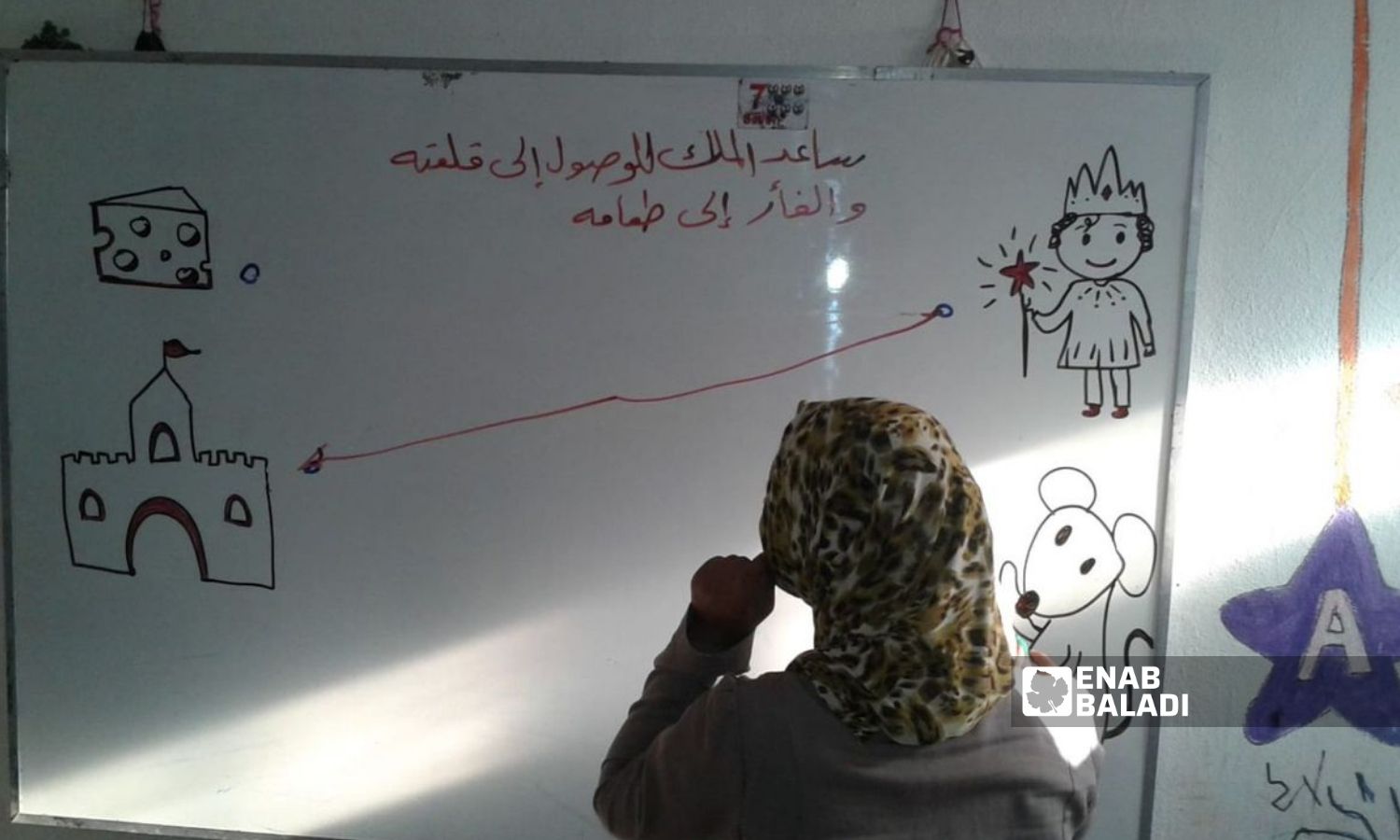



Enab Baladi – Huda al-Kulaib
“Lonely and sad,” the six-year-old Maram al-Khashan, who was diagnosed with Down syndrome, spends most of her time in an abandoned IDP camp in northwest Syria.
Maram lives in difficult conditions with her family in the unofficial Killi camps near the city of Idlib. The child’s suffering is compounded by the inability to go out and move in the camp after she got lost among its many close-knit tents several times, her mother, Maryam al-Khashan, 32, told Enab Baladi.
“Maram and other children with disabilities do not find an opportunity for recreation, education, or health care in these forgotten camps,” the mother said.
Children with disabilities live in Idlib’s IDP camps, northwest of Syria, in unhealthy environments, amid constant dangers of pollution that varies between open sewage and neglected infrastructure, in addition to the constant shortage of food and medicine and the absence of specialized educational or vocational schools.
The attempts of Khadija al-Omar, 40, to rehabilitate he son Wael (8 years), who complains of mental disability, speech difficulties, and hyperactivity, were unsuccessful after his speech training and integration attempts into family and society failed, especially with the absence of any specialized assistance centers in the Atma camps on the Turkish border, where she lives along with her husband and three children, the mother told Enab Baladi.
Al-Omar, 40, tried to get Wael into the school in the camp, but she did not notice any development or progress in his educational level due to the school’s lack of cadres and teachers capable of dealing with his condition, which prompted her to abandon the idea of educating him, she said.
For her part, Yusra al-Rabae, 33, who resides in the Deir Hassan camps, spoke about the condition of her daughter, who has a movement disability as a result of brain atrophy, and who does not find any interest or care from any party.
Al-Rabae told Enab Baladi that her 10-year-old daughter, Amal, has difficulty moving around the camp, which has bumpy roads filled with waste and dust, made worse by the lack of bathrooms suitable for her disability and the long distance separating her from health centers and free medical services.
Children with disabilities suffer marginalization in the camps, depriving them of their most basic rights to education and integration, while they have abilities and talents that are lost “in the absence of educational methods that suit their needs, or training programs that unleash their talents and capabilities,” al-Rabae added.
The al-Amal center for children with disabilities in al-Dana town is trying to care for and educate this category by strengthening children’s social skills, facilitating their integration into society, and developing their abilities, the director Ghinwa Nawaf told Enab Baladi.
The al-Amal center is the only center concerned with caring for people with disabilities near the camps, while there are several centers in Idlib city at a far distance.
Nawaf indicated that the center, which was established at the beginning of 2021, with voluntary efforts in the northern countryside of Idlib, takes care of hearing and brain disabilities, Down syndrome, and autism, as the number of children benefiting from the center has reached about 100 children from the areas of Sarmada, Bab al-Hawa, Deir Hassan camps, Termanin and Kfar Karmin.
Al-Amal center educates children within specialized programs according to their health condition. Activities focus on child rehabilitation and education, communication language, sign language, speech rehabilitation, recreational activities, psychological support, and rehabilitation sessions with children, caregivers, and parents.
Nawaf said the center provides free services, with the exception of transportation, which is at the parents’ expense, and that what prevents large numbers of children with disabilities from accessing the center’s services is the poor financial capabilities of their families and their inability to cover transportation expenses and fees.
The center began providing its services on a voluntary basis a year and a half ago before receiving support from some parties, the most recent of which was the support provided by the Bunyan organization, but it stopped today after the expiry of the contract term.
“There is no intention to stop its work even with the cessation of funds, as giving continues,” Nawaf assured.
At least 73,188 people with disabilities live in northwestern Syria, according to the latest statistics issued by the Syrian Response Coordination Group (SRCG) in August.
This category suffers from problems and challenges faced by the displaced as well- albeit more severely- because it is the most vulnerable.
Most challenges lie in the absence of health care and preventive bases for the various types of common diseases, the constant shortage of food and water, and the lack of the most basic daily services.
if you think the article contain wrong information or you have additional details Send Correction